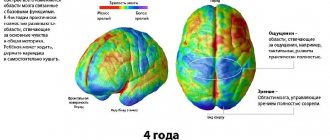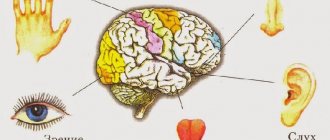Voluntary and involuntary mental processes
Any type of human mental activity can be involuntary (unintentional) or voluntary (purposeful) in nature. Unintentional activity does not involve effort or planning. Actions in this case are characterized by impulsiveness and lack of clear awareness (for example, the behavior of people in a state of passion, trance or any other altered state of consciousness).
Are you an expert in this subject area? We invite you to become the author of the Directory Working Conditions
In situations where activity is required to achieve any consciously set goal, volitional efforts are necessary. Here will acts as a person’s ability to consciously and actively manage his activities. It helps to overcome obstacles in order to achieve a set goal, and creates additional motivation for action (for example, when existing motivation is insufficient). The amount of effort made by a person to overcome the obstacles that have arisen reflects the degree of development of his volitional sphere.
Involuntary actions are the result of the manifestation of unconscious or insufficiently clearly conscious impulses. They have an impulsive character and lack a clear plan. Voluntary actions are characterized by the presence of a conscious goal, a preliminary presentation of operations that will help ensure its achievement.
The following features are inherent in voluntary processes that are associated with will:
- A felt and conscious voluntary reaction;
- The emergence of a voluntary reaction in response to the emergence of a vital need, which is a means of satisfying it;
- A voluntary reaction is not, as a rule, forced (a person can replace it by his own choice with another reaction that has the same vital significance);
- Conscious regulation during implementation in the case when voluntary reactions are still forced.
Finished works on a similar topic
Course work Will as a mental process 450 ₽ Abstract Will as a mental process 240 ₽ Test work Will as a mental process 210 ₽
Receive completed work or specialist advice on your educational project Find out the cost
What you need to know about will
Lack of will is the highest barrier that prevents a person from changing. The problem is that it needs to be used on a daily basis, not every now and then to create a good habit or break a bad one. All our serious goals and plans collapse precisely because of our inability to control our will.
The concept of delayed gratification is closely related to will. In simple terms, it is the ability to focus on a long-term goal so as not to notice instant gratification that can interfere with plans. A week of intense training at the gym won't matter if we have a wild weekend of eating nothing but pizza and drinking.
Will is a limited resource. If we try to change, for example, stop acting impulsively, then by the evening we may experience depression and frustration. This threatens to return to an old habit. However, two points should be taken into account. First: the will can be trained - and thus we will be able to exercise it much longer during the day. Second: willpower can be wasted if you do not do what you need.
Since will is a limited resource, you need to plan your day in such a way as not to waste it. For example, avoiding places that may trigger a bad habit.
A high level of willpower almost always means high self-esteem (after all, we have something to be proud of), the ability to resist temptations in the form of alcohol, cigarettes and overeating, and improved mental and physical health.
Depleted willpower makes a person impulsive. This means that if you feel that your will is at zero, you need to do everything possible to remove temptations out of sight.
If you are convinced of the exceptional importance of developing the will, let's see exactly how this can be done. Remember that you have a long journey ahead, perhaps life-long.
1
Develop moral qualities
Researcher Kurt Gray, a doctorate in psychology at Harvard, explains this effect as a self-fulfilling prophecy: “People around them consider highly moral people to be more strong-willed and disciplined, able to endure discomfort without losing their heads.”
The researcher is confident that Gandhi or Mother Teresa were most likely not born strong-willed people, but became such by trying to help others. He introduces the concept of “moral transformation” because he suggests that moral actions can transform people from being lazy and procrastinating to strong-willed.
2
Don't waste your will
If you try really hard, you can completely exhaust your will by noon, which will have a catastrophic effect on the rest of the day and those important decisions that you will never be able to make.
For example, you set a goal to change your character, as Franklin did: allocate one or two weeks to one quality. It's a long marathon, so there's a lot to plan for.
Make not very important decisions in advance, which usually “suck” your energy. Create a menu for the coming months and stick to it. Buy the same shirts, trousers and shoes so as not to waste mental resources constantly thinking about what to wear and wear. Here and now you need to make only those decisions that concern your character. Take care of the rest in advance.
The same tips apply to other areas of life: losing weight, getting rid of bad habits, achieving the Advanced level in learning English and much more. Make all the non-important decisions in advance and focus only on the most important ones. Don't waste your will.
3
Have a self-reflection session
For this you will need a diary. Write down all the actions that you perform unconsciously (they have become habitual), but which you want to get rid of. For example:
- While working, I am constantly distracted by news sites.
- While reading, I like to be distracted by my phone.
- During a conversation, I focus on what I want to say, and not on the words of the interlocutor.
If you make a list of at least ten points, this can already be called a good self-reflection session. Now choose your two most destructive habits.
Write down what sequential actions these unwanted habits consist of. Actions should also be understood as thoughts and emotions associated with them. For example, if you tend not to listen when you're talking to someone, notice what thoughts or beliefs pop into your head. Probably, they are the ones that prevent you from concentrating on productive dialogue. Examine the nature of these thoughts.
Think about how you can stop this behavior. Remember that you can be conscious in every action you take. It's about habit, the main thing is to recognize the sequence of steps.
Over the next month, take full control of these two habits.
4
Stop for three seconds
Our life is a kilometer-long chain of habits. Some of them help, others hinder.
Throughout the day, stop in the middle of any activity (unless you're driving, of course) and think about what stage of which habit you are currently in. If we are talking about consuming bad food, then even pleasant thoughts about Coca-Cola are already part of the habit. Think for three seconds: what will this thought lead to? Of course, to the hype: “without cola I will be an unhappy person, but with cola I will be the happiest person on the planet.” Then go and buy it. Remember further: after you drank this soda, how do you feel? And in half an hour? It can be revealed that in fact you were deceiving yourself, becoming a victim of advertising and habit.
Try to be aware of yourself for three seconds as often as possible throughout the day. Using this method, you can get rid of the irresistible desire to criticize, get angry and be offended. Once “three seconds” becomes a habit, you will no longer exhaust your willpower with this exercise (it will begin to be performed automatically) and you will be able to change, motivate yourself to work, or stop unwanted actions much faster and more effectively.
We wish you good luck!
Did you like the article? Join our communities on social networks or our Telegram channel and don’t miss the release of new useful materials: TelegramVKontakteFacebook
We also recommend reading:
- Storytelling
- What is the implementation of intentions
- Strategy for overcoming bad habits
- Overcoming Negative Behavior
- All about habits +Marathon!
- Halperin's theory of mental action
- Formation of useful habits
- Spheres of personality
- Volitional personality traits
- Mental processes: types and brief description
- How to review your progress over the past six months
Key words:1Psychoregulation, 4Psychoregulation
Features of volitional processes and functions of the will
Volitional processes stand out as a separate layer of mental phenomena. Scientists do not contrast these processes with cognitive and emotional ones, since one process can be cognitive, volitional, and emotional. An example is voluntary attention.
The initial motivations for action include needs. Thus, the rudiments of will are already contained in them. Unlike needs, motives are mental incentives to carry out activities. They become not only stimuli, but a personal processing of the stimulus (need, need). If unambiguous motives predominate, then they begin to enhance the possibility of achieving the goal.
The emergence of motives that contradict the achievement of the intended goal inhibits a person’s activity. In some cases, this is a manifestation of lack of will.
Thus, the will as a mental process is endowed with oppositely directed, but related functions: incentive and inhibitory. The first of them is provided by human activity, which generates action due to the specific internal state of the subject (discovered during the action itself).
The inhibitory function of the will does not in any case create obstacles to obtaining a positive result of activity. It acts in unity with the incentive function and is characterized by restraining unwanted manifestations of activity.
Thus, an individual may simultaneously have an urge to engage in two types of activities. If he takes on them at the same time, this will cause damage to both one and the other (struggle of motives). A motive assessed by a person as more significant now gives rise to the incentive function of the will. The motive that is of less importance becomes the object of the inhibitory function.
In addition to the above, the inhibitory function can manifest itself in cases when a person’s impulses contradict his ideas about the necessary model of behavior. For example, if he is very hungry, he may have the urge to steal bread from a store. For most people, such behavior is internally unacceptable, so willpower will slow it down.
Classification
Modern psychology divides human will into three types:
- Spiritual or free. Developed among believers. They independently decide to limit themselves from worldly goods and lead an ascetic lifestyle.
- Natural. Inherent in any individual, but developed to varying degrees. Helps to overcome various difficulties on the way to the intended goal, gives motivation for action.
- Forced. It occurs when a person acts depending on the imposed opinions of other people.
The last type of will is control, which is often used by leaders, teachers, and educators.
How to develop willpower
A girl who is losing weight may not be happy with a strict diet and exhausting workouts, but she needs to do it to look good. It is difficult for a student to get up early to come to the first class, but he must do it, otherwise he will not receive the coveted diploma. The child does not want to clean his room, but does it so that his parents don’t get in trouble.
From this it is clear that the will is not associated with joyful impulses, but with forcing oneself to some activity, action or inaction (sometimes not doing something is also a manifestation of the will. For example, not smoking).
- Literally forcing yourself is violence. A person will not be able to mock himself endlessly and one day he will give up without reaching his goal. Therefore, the first piece of advice is to find the right motivation for yourself.
Well, for example. An elderly man (old man) will lead a healthy lifestyle (HLS) in order to maintain his health and, as a result, live longer.Such motivation will not work for a young man who is full of strength, because he is still far from death and does not think about it at all. But he can motivate himself to play sports for the sake of female attention. Honesty with yourself is the key to effective motivation.
Willpower is cultivated by such a quality as courage. Many decisions are put off by people due to fears (often irrational) and lack of confidence in their abilities. A brave person goes forward, even if he is scared. There are no people who are not afraid of anything. There are those who are afraid and do, and those who are afraid and inactive. Everyone is afraid - remember this. Courage and courage are trained like this: you must do what you are afraid of. Along with these actions comes the feeling of “I can do it!”, self-esteem increases and self-confidence appears. Willpower requires constant training. If something doesn’t work out once, you need to try a second, third... tenth time. Failure is also an experience. It is necessary to analyze your actions, rethink them, change tactics and strategy, think more often about the goal, get up and move on.
Good luck to you! See you soon on the blog pages KtoNaNovenkogo.ru
* By clicking on the “Subscribe” button you agree to the privacy policy.
Collections by topic
- Questions and answers
- I use it to earn money
- Useful online services
- Description of useful programs
I use it to earn money
Improvement
The first stages are formed in childhood. And the education provided by parents plays a huge role in this matter. If they pamper their child, do everything he asks, and try to indulge him in every possible way, then, most likely, he will grow up capricious, in a negative sense, stubborn with passive inclinations. This entails a certain danger, since upon entering adulthood, the individual will expect similar parental behavior from others.
But if mom and dad initially set serious demands on the baby (not to be confused with despotic ones), then from an early age the child will learn to achieve the goals set. And one of the effective ways to do this is to send him to a circle. But it is he who should choose it, since imposing hobbies is fraught with negative consequences in the future. It is important not to completely control the interests of children, but to promote their development.
Let's say a boy or girl really likes to draw. This means that such an aspect as passion is already present. But the second factor – patience and discipline – must be created. Therefore, it is worth giving your child drawing tasks, praising the results and providing a reward for achievements.
But you can engage in development as an adult, although this will be much more difficult if the habit of self-discipline is absent. Let's consider one of the methods step by step:
- Select a tool. This implies the area where efforts will be applied: profession, interests and hobbies. The best option is to choose the area where experience is at zero. Then progress will be visible much more clearly.
- Setting goals. At first they should be small. So, for example, a man who comes to the gym for the first time is unlikely to lift a barbell weighing 100 kg. It's the same in programming, writing or painting. If you immediately set global goals for yourself, you can quickly “burn out” without getting the desired result.
- From simple to complex. As soon as you begin to confidently perform the simplest actions, then increase the complexity. Otherwise, there is a risk of remaining at the same level.
- Write it down. Record successes and analyze failures. This will provide additional motivation and prevent further mistakes.
Development methods
Strong-willed qualities can and should be developed. This can be done in several ways:
- Do exercises every day, force yourself to exercise. This method helps develop fundamental good habits.
- Do important things as early as possible, do not leave them for tomorrow.
- Create a clear schedule. Set aside time for active activities, rest, eating, and self-development.
- Don't stop when difficulties arise.
To make doing things enjoyable, you need to set motivation for yourself in advance and reward yourself at the end of the journey.
Will in psychology is a force that helps to achieve a goal with any effort, regardless of the difficulties and obstacles encountered along the way. Volitional qualities develop in different ways. One person can keep himself from bad habits, but another cannot. If desired, volitional qualities can be developed to the required level. For this, different techniques are used.









